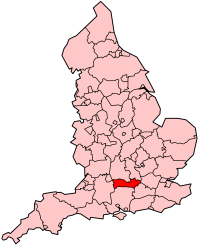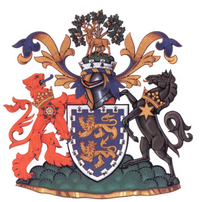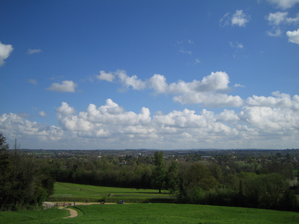Berkshire

Berkshire's Location within England |

Berkshire's Coat of Arms |

Berkshire's Districts
-
West Berkshire (Unitary)
-
Reading (Unitary)
-
Wokingham (Unitary)
-
Bracknell Forest (Unitary)
-
Windsor and Maidenhead (Unitary)
-
Slough (Unitary)
|
Berkshire;
sometimes abbreviated to Berks) is a ceremonial and traditional county
in the south of England,
to the west of London
and also bordering on Oxfordshire,
Buckinghamshire,
Greater London, Surrey,
Wiltshire and Hampshire.
It is also known as
The Royal County of
Berkshire — this title being made official with a grant in the
1930s.
| Geography |
| Status |
Ceremonial and
Non-metropolitan county (no county council)
Traditional county |
| Region |
South East England
|
Area
- Total |
Ranked 40th
1,262 km² |
| NUTS 3 |
UKJ11 |
| Demographics |
Population
- Total (2003 est.)
- Density
|
Ranked 26th
803,657
636 |
| Ethnicity |
88.7% White
6.8% S.Asian
2.0% Afro-Carib. |
| Politics
|
| Members of Parliament
|
Adam Afriyie
Richard Benyon
Andrew Mackay
Fiona Mactaggart
Theresa May
John Redwood
Martin Salter
Rob Wilson |
History
The county is one
of the oldest in England,
being reliably dated back to the setting of the traditional county borders
by King Alfred the Great of Wessex. Following the reorganisation of local
government in 1974, Abingdon
(its traditional county town) and the Vale
of the White Horse were transferred to Oxfordshire,
Slough
was added from Buckinghamshire,
and Reading
became the county town. On April 1, 1998 the county council was abolished
and the districts became unitary authorities.
The county takes its name from
a large forest of birch trees that was called Bearroc (Celtic for 'hilly')
and was originally a transaction of land to King Cenwalh of Wessex. At
this time, it only consisted of the northerly and westerly parts of the
current county.
Berkshire
has been the scene of many battles throughout history, during Alfred the
Great's campaign against the Danes, including the Battle of Englesfield,
the Battle of Ashdown and the Battle of Reading. During the English Civil
War there were two battles in Newbury. During the Glorious Revolution
of 1688, there was a small Battle of Reading
Geography & Geology
The highest point
in the county is Walbury Hill at 297m (974ft). It is the highest point
on Salisbury Plain and in the whole of South East England.

The Kennet Valley
Demographics
According to 2003
estimates there are 803,657 people in Berkshire,
or 636 people / km2. The population is mostly based in the urban areas
to the east of the county, with West Berkshire being much more rural.
The population has
increased massively since 1831, this may be in part due to the sweeping
boundary changes however. In 1831 there were 146,234 people living in
Berkshire, by
1901 it had risen to 252,571 (of which 122,807 were male and 129,764 were
female).
Population of Berkshire:
1831: 146,234
1841: 161,759
1851: 170,065
1861: 176,256
1871: 196,475
1881: 218,363
1891: 238,709
1901: 252,571
Politics
Berkshire
is a ceremonial and traditional county, and it is unusual in England
in that it is the only administrative county with no county council. The
district councils are unitary authorities but have no county status. In
the unitary authorities the Conservatives control the West Berkshire,
Wokingham and Bracknell Forest councils, Labour control Reading council,
whilst the Liberal Democrats control the Windsor and Maidenhead council.
Slough is controlled jointly between the Liberal Democrats and Conservatives.
Since the 2005 general
election, the Conservative Party dominates, controlling 6 out of 8 constituencies.
Slough and Reading West are both represented by the Labour Party.
Settlements
The largest town in
Berkshire by population
is Reading,
however possibly more famous is the town of Windsor,
the most famous resident being Queen Elizabeth II.
By population:
Reading
(144,000)
Slough
(119,070)
Maidenhead
(60,000)
Bracknell
(52,000)
Newbury
(32,000)
Due to the administrative
changes in 1974 there are a number of towns which are no longer administered
as part of Berkshire,
but instead as part of Oxfordshire.
These include Abingdon,
Didcot,
Faringdon,
Wallingford
and Wantage.
|







